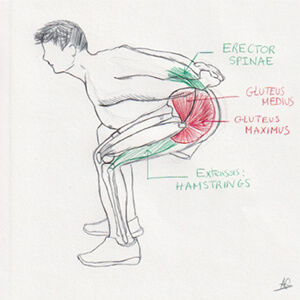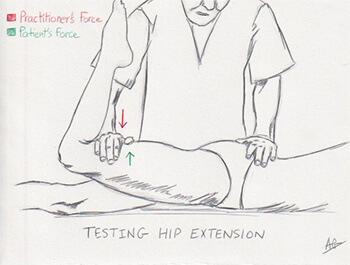 A strong and healthy back needs healthy gluteal function.
A strong and healthy back needs healthy gluteal function.
However, in many cases, if we test gluteal function during squats, people with a history of back pain appear to have inhibited gluteal activation.
The goal of a squat is rising up and extending the hip. Pushing through your heels will usually fire up the gluts. If you feel too much pressure on your lower back and your spine, it means you are not using your gluteal muscles.
Research (for now) can’t say if this weakness is prior to back pain or a consequence of it. These muscles may also be tested by the practitioner, with the patient laying on their stomach and testing hip extension or the patient laying on their back and testing hip abduction.
 You might remember me testing these muscles on you if you’ve been to the clinic.
You might remember me testing these muscles on you if you’ve been to the clinic.
Those who are unable to hold the pressure have aberrant gluteal patterns. They cannot spare their backs during squatting patterns they use their hamstrings and erector spinae to drive the extension motion.
Sub-consequently, the erector spinae imposes unnecessary loads to the lumbar spine. In this way, healthy gluteal patterns are needed to spare the back.
Made simple: if you can’t fire up your buttock muscles, the muscles along your spine and your hamstrings will take up the load. This is why you end up with a stiffness in the lower back and/or really tight hamstrings.
It is impossible to rebuild optimal squat performance, without well-integrated hip extensor patterns. In fact, the failure of many people to rehabilitate is due to the neglect ability to squat and rise of the toilet or egress from a car seat or walk up the stairs, without first addressing the aberrant gluteal patterns.
How to address this lack of gluteal function?
Some patients will need to start with specific exercises to re connect with these muscles. Weakness of a muscle means there is a missing link between the nervous system and the muscle. Squats are quite hard and require co-activation of many muscles. That’s why, easier exercises are necessary to target those muscles.
In conclusion, if you’re getting excited about the summer, before running off to your squats, get tested by a chiropractor or a specialist for the failure of muscles essential to your spinal health.
- Annabelle Gerrard DC
